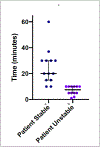Clinician Ethical Perspectives on Extracorporeal Membrane Oxygenation in Practice
- PMID: 34414798
- PMCID: PMC8858336
- DOI: 10.1177/10499091211041079
Clinician Ethical Perspectives on Extracorporeal Membrane Oxygenation in Practice
Abstract
Purpose: Extracorporeal membrane oxygenation (ECMO) is an expensive and scarce life sustaining treatment provided to certain critically ill patients. Little is known about the informed consent process for ECMO or clinician viewpoints on ethical complexities related to ECMO in practice.
Methods: We sent a cross-sectional survey to all departments providing ECMO within 7 United States hospitals in January 2021. One clinician from each department completed the 42-item survey representing their department.
Results: Fourteen departments within 7 hospitals responded (response rate 78%, N = 14/18). The mean time spent consenting patients or surrogate decision-makers for ECMO varied, from 7.5 minutes (95% CI 5-10) for unstable patients to 20 minutes (95% CI 15-30) for stable patients (p = 0.0001). Few clinician respondents (29%) report patients or surrogate decision-makers always possess informed consent for ECMO. Most departments (92%) have absolute exclusion criteria for ECMO such as older age (43%, cutoffs ranging from 60-75 years), active malignancy (36%), and elevated body mass index (29%). A significant minority of departments (29%) do not always offer the option to withdraw ECMO to patients or surrogate decision-makers. For patients who cannot be liberated from ECMO and are ineligible for heart or lung transplant, 36% of departments would recommend the patient be removed from ECMO and 64% would continue ECMO support.
Conclusion: Adequate informed consent for ECMO is a major ethical challenge, and the content of these discussions varies. Use of categorical exclusion criteria and withdrawal of ECMO if a patient cannot be liberated from it differ among departments and institutions.
Keywords: ethics; extracorporeal membrane oxygenation; informed consent; withdrawal of life-sustaining treatment.
Conflict of interest statement
Declaration of Conflicting Interests
The authors declared no potential conflicts of interest with respect to the research, authorship, and/or publication of this article.
Figures




References
-
- McCarthy FH, McDermott KM, Kini V, et al. Trends in U.S. Extracorporeal membrane oxygenation use and outcomes: 2002-2012 [Internet]. Semin Thorac Cardiovasc Surg. 2015;27(2):81–88. Accessed December 2, 2020. https://www.ncbi.nlm.nih.gov/pmc/articles/PMC4780346/ - PMC - PubMed
-
- Zangrillo A, Landoni G, Biondi-Zoccai G, et al. A meta-analysis of complications and mortality of extracorporeal membrane oxygenation. Crit Care Resusc. 2013;15(3):172–178. - PubMed
-
- InternationalReport July_page1.pdf. [Internet]. Published July 2020. Accessed December 2, 2020.https://www.elso.org/Portals/0/Files/Reports/2020_July-JanuaryRange/Inte...
MeSH terms
Grants and funding
LinkOut - more resources
Full Text Sources

